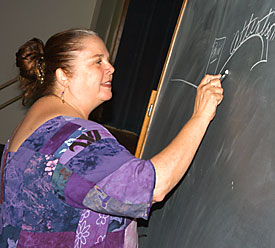 |
|
DEREKH FROUDE/Arizona Daily Wildcat
|
Patti Harada, a grief and trauma counselor, speaks to a small group in the University Medical Center's Du Val Auditorium yesterday evening about how to build healthier relationships.
|
|
By Kaila Wyman
Arizona Daily Wildcat
September 19, 2002
Communication, responsibility key to making each relationship safe, healthy, fulfilling
Sue, a UA student, met Greg, a really hot guy, during a study group for one of her classes.
Bragging to all her friends that he winked at her, her friends convinced her to ask him out.
Greg said yes, and after a short date on which they grabbed some ice cream, they rented a movie and headed back to his place where they sealed the deal on their first date.
The entire next week Sue sat by the phone waiting for her new love to call. When he didn't, she decided to call just to say hi, only to receive a brush-off from him.
A couple weeks later, they bump into each other at the bar and go home together.
She thinks they are having a relationship and he thinks she is just a convenient friend.
These pretend characters follow suit to many typical so-called relationships that college women have, said UA psychology professor Patti Harada.
The way around unfulfilling relationships is through being open but self-responsible.
For a strong, healthy relationship, the woman needs to take care of herself and the man needs to take care of her as well.
"Men need to give care in order to have self worth and women need to be self-loving so they will be honest with men," said Harada, a grief and trauma counselor for 18 years.
Harada spoke to about 30 people last night in Du Val Auditorium about how to deal with relationships when it seems like one person is doing all the work. Her talk is part of a weekly series on various aspects of relationships.
She focused greatly on the effort that women put into relationships because they are usually the ones who put too much work into them.
This particular forum was focused on heterosexual relationships, however Harada does counseling for gay and lesbian relationships, too.
Harada said she is OK with women asking men out, but she said she would then like to see women take a step back and let the men make the next move.
"A lot of girls are in relationships that the guys don't know about," she said.
Until you can give yourself what you want, you may not find someone who can give it to you, Harada said.
Psychology senior Melissa Austin, also a teaching assistant to Harada, attended the open seminar with three of her close friends.
"I would clip a man's fingernails if he wanted me to and they need to do that themselves, so it is good for me to come and listen," she said.
Harada teaches psychology of death and loss as well as psychology of love and spirituality.
Both classes are open to all majors and fill up within a few hours after being opened for student registration.
"I always find Patti's lectures really interesting," said Andy Lebovitz, a pre-business sophomore. "There was one that she gave on 9/11 that related to death and loss that was really good."
In her Death and Loss class, Harada gets students to open up and discuss their own personal experiences with 102 other students.
"I always try and make it about their stuff, like their issues with dating, sex and who initiates relationships," she said.
After each class she has the students write their reaction to the class material and to their own personal feelings and most of the time is able to respond to every students' writings.
"It is the best thing in the world to me to walk into the classroom and know that they know that they matter to me and I matter to them," Harada said.
Every Wednesday she holds a discussion from 7 p.m. to 9 p.m. in University Medical Center's Du Val Auditorium that is open to the general public.
The cost is $10 to community members and $5 to UA faculty, staff and students.
Next week's discussion will be based on what to do when one person in a relationship feels that the other needs help for a problem and the other will not seek it.

